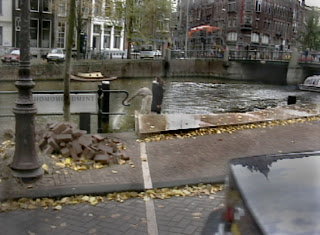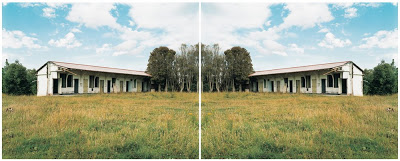Friday 30 July 2010
Ron Brownson
John De Stefano and Ann Shelton have opened their photographic exhibition Double Take/Time Frame at RMIT’s PROJECT SPACE / SPARE ROOM. It includes an engaging essay by Martin Patrick and images of the artwork that they have included in the show that is also web accessible:
http://schoolofartgalleries.dsc.rmit.edu.au/PSSR/exhibitions/2010/double_take.html
I enjoyed reading Martin’s essay. It reminded me of the title of Nabokov's incisive memoir about his early life in Russia: Speak Memory. The essay demarcated an interesting contemporary take on the creative power of memory. Not nostalgia, or even retro-sense, but the welling effect of perception influenced by current stimuli as a means to reach straight into the past. The creative locus that drives all of Marcel Proust's work.

John Di Stefano, Ashes [Amsterdam] 2008
Single channel video projection, 5 minute loop
Somehow, putting distance between the representation of their photographs, their locality so to speak, and where they are exhibited actually affects how they are read and perceived. Perhaps this is the notion that Peter Tomory identified in reverse:Distance Looks our Way.

Ann Shelton, Cell, (after An Angel at My Table) Seacliff Asylum, North Otago, New Zealand 2003
Diptych, C Type prints
John and Ann’s exhibition raises the question: if we separate a place filled up with history from the culture which it was born in, what changes happen to the image’s meaning? This is an interesting conundrum.